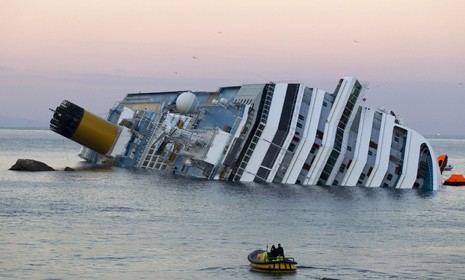The Costa Concordia: Should captains always go down with the ship?
The ill-fated cruise liner's captain has been vilified for leaving in a lifeboat before some of his passengers. Is that fair?

Italian cruise ship captain Francesco Schettino faces criminal charges after abandoning his sinking ship, the Costa Concordia, while some of his 4,200 passengers were still on board. A coast guard captain became a hero for screaming at Schettino to get back on the ship to help the "women and children," while the disgraced Schettino insisted to a judge that he hadn't fled — he "tripped" and fell into a lifeboat. That "lame explanation" only fueled the public's anger over the disaster, which left at least 11 people dead, with 21 more still missing. Is it really necessary for a captain to be the last one to leave a sinking ship?
It's unfair to demand heroism from anyone — captains included: "We imagine a captain on his deck, as he slips under the waves," says Theodore Dalrymple at Britain's Telegraph. But there's no reason to expect a captain to simply go down with the ship, especially if doing so doesn't save any lives. Some people react bravely in the face of danger, some don't. Schettino "panicked at the one crucial moment of his career," and his punishment is that he'll have to live with it. We shouldn't make things worse by piling on.
"Concordia disaster: Should a captain go down with his ship?"
The Week
Escape your echo chamber. Get the facts behind the news, plus analysis from multiple perspectives.

Sign up for The Week's Free Newsletters
From our morning news briefing to a weekly Good News Newsletter, get the best of The Week delivered directly to your inbox.
From our morning news briefing to a weekly Good News Newsletter, get the best of The Week delivered directly to your inbox.
But it's a captain's duty to be the last to leave: It is "the way of a captain" to be the last to abandon ship, ocean-liner historian John Maxtone-Graham tells Salon. Schettino "should have stayed and helped save passengers" by leading the evacuation, maintaining discipline, and, if necessary, climbing through mangled, flooded corridors and cabins himself to rescue anyone trapped below. "He will likely go to prison before he ever goes to sea again."
"The captain who wouldn't go down with the ship"
The code of the sea captain is changing: In the old days, sea travel was treacherous, says Christopher Caldwell at the Financial Times. Every captain understood that if disaster struck, "the job required staying aboard — and even going down with — the ship." But these days, the "dangers of sea travel are the very last thing cruise lines want their customers to think about." Cruising has become so safe that Schettino didn't think he had to honor the solemn code of "sea captains of yore" — he figured his job was just "keeping the party going."
"Inadvertent lesson from a nautical scoundrel"
A free daily email with the biggest news stories of the day – and the best features from TheWeek.com
-
 ‘No one is exempt from responsibility, and especially not elite sport circuits’
‘No one is exempt from responsibility, and especially not elite sport circuits’Instant Opinion Opinion, comment and editorials of the day
-
 Businesses are caught in the middle of ICE activities
Businesses are caught in the middle of ICE activitiesIn the Spotlight Many companies are being forced to choose a side in the ICE debate
-
 Leadership: A conspicuous silence from CEOs
Leadership: A conspicuous silence from CEOsFeature CEOs were more vocal during Trump’s first term